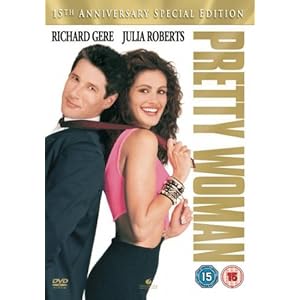
The other night my partner and I ended up watching the film Pretty Woman, which I hadn’t seen for many years. It’s a kind of modern fairy tale (knowingly?) in which the attractive prostitute, Vivien, played by Julia Roberts, is bought by the sophisticated millionaire tycoon (Richard Gere) and in this short space of time, said couple fall in love. When the millionaire offers to provide Vivien with an apartment, money, etc. and set her up as his lover, she turns him down, insisting that she wants the “fairy-tale ending” (full relationship? marriage?) which, of course, he ultimately provides.
It’s an entertaining story, and despite the main character
being a hooker, there is little sex, the emphasis being on romantic
comedy. I enjoyed seeing it, but the
message still makes me uncomfortable.
Deep down, do all women really want the “fairytale ending” (i.e. to be taken care of by a man). And not just any man. He has to be good looking and, more
importantly, very rich. (a la Fifty
Shades of Grey). If this is a
universally shared female dream, is it wrong?
It doesn’t appeal to me, so am I in the minority? It lies at the root of so many hugely
successful stories so it must be a powerful fantasy.
Years ago, in another life, I was working with a group of
grammar school girls as part of a careers day, discussing the life of a
writer. I asked the girls to tell me
what their career ambitions were and more than one replied, perfectly
sincerely, “To marry a rich footballer and be famous and never have to work.” This made me feel rather sad. I suggested that a contingency plan might be
in order, in case such an ambition did not come to fruition.
Fantasy and reality.
It's so sad to only have an ambition that defines you as some kind of appendage. I, too, have heard girls say they want to be a WAG (footballer's wives and girlfriends). I love Pretty Woman as pure fantasy - but I kind of thought she meant that she didn't want to be 'kept' as a glorified whore and that she wanted to be acknowledged publically and treated as an equal (the fairytale ending). Mind you, I could have just been watching with an optimistic/feminist/idealistic head on! Great post and food for thought.
ReplyDeleteHi Linda - thanks for insight and you are probably right when you say she didn't want to be a "kept" woman and therefore on equal footing. I didn't think of that. But the fact that the man is rich is just too significant, so that when married to him she would still be a kept woman because of his wealth. I was reminded of Jane Austen at the end, and the way that because of a woman's status then, she had to find a moneyed husband to simply survive. It's an interesting topic. When I was at Uni I came across quite a few theses on the messages behind Pretty Woman from a feminist perspective while I was doing my thesis on feminism, sub/dom relationships and Nine and a Half Weeks! Happy days!
Delete